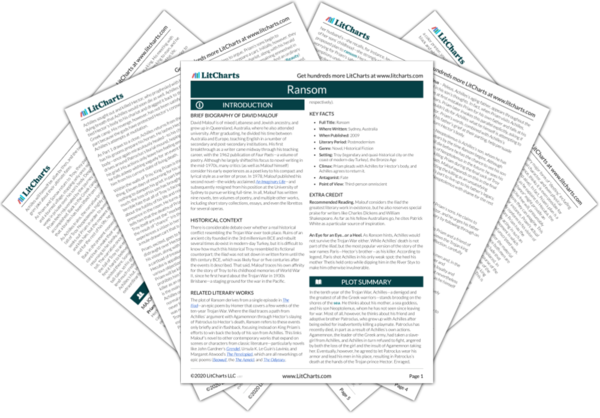Ransom payment is without question the most important symbol in Malouf’s novel, but its meaning is complex and multilayered. In fact, the treasure that Priam provides to Achilles in exchange for his son Hector’s body is just one of a series of “payments” in Ransom, each of which adds nuance to the basic idea of buying back something valuable. Priam’s name, for instance, means the “price paid”—a reference to the fact that as a boy he was nearly sold into slavery after Heracles sacked Troy, and his freedom was only secured (or “purchased”) when his sister begged it as a “gift” from Heracles. His second lease on life, however, also comes at a price: his first name and identity, Podarces, was changed to Priam after he was granted his freedom. And so the gift of freedom also requires a kind of “death.” This episode, then, begins to link the literal payment of ransom to the figurative price humans pay for being alive: death. Priam eventually makes this symbolism explicit in a speech he delivers as he pleads with Achilles; arguing that the two of them are united in their mortality, Priam describes death as a “fee paid in advance.”
However, while death itself is a form of ransom in the novel, Malouf also suggests that the payment of ransom can be a way of cheating death. When Priam imagines bringing Hector’s body back, for example, he describes his son as “newly restored and shining, restored and ransomed,” as if his own actions have preserved Hector’s body from the physical effects of death. In reality, it is the gods who have protected Hector’s body from decay, but Priam’s remarks raise the possibility of metaphorically overcoming death through payment or sacrifice. As the novel ends, for instance, Achilles feels newly alive despite the fact that he knows his own death is rapidly approaching, simply because his interaction with Priam has given him a new identity as a human rather than as a warrior.
Ransom Quotes in Ransom
This time, when I look behind me, what is glowing out from under the coverlet…is the body of my son Hector, all his limbs newly restored and shining, restored and ransomed.
And perhaps, because it is unexpected, it may appeal to him to: the chance to break free of the obligation of being always the hero, as I am expected always to be the king. To take on the lighter bond of being simply a man. Perhaps that is the real gift I have to bring him. Perhaps that is the ransom.
[Death] is the hard bargain life makes with us—with all of us, every one—and the condition we share. And for that reason, if for no other, we should have pity for one another's losses.

















